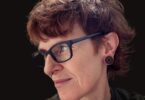The woman smoking meth across from the bodega looks like your sister, so you offer her a pack of cigarettes and forty-three dollars if she’ll pretend to be her for one night. You could afford to pay more, but this is all you have in cash and she takes it. Up close, she looks less like Reed: acne sockets her forehead, her jaw is too canine, cheekbones industrial instead of suburban, eyes minnows instead of hummingbirds, but you’ve already paid up. She wears an olive parka unzipped over bike shorts and an iridescent bralette with a pyramid cut-out over her solar plexus, like a refugee from the future.
“What’s your name?” She rasps out a screw of smoke. The neon sign from the liquor store behind her blinks red and blue, bleaches the smoke with colour.
“Wolf.”
“Wolf. That’s good, lots of people use a fake name. That’s okay with me.”
“That is my name.”
“Sure.” She shuffles her pipe through her knuckles. A streetlamp refracts through the glass chamber and reflects a syzygy of dots in her pupils. Looking into her eyes is like looking into an infinity mirror.
◊ ◊ ◊
The city stings. It’s night and tires raze the pavement, oil-slicked and shimmering like bismuth. The sky is bitumen dark. No moon, or it’s hazed out by light, by carbon, ozone, lead.
You buy Reed a cup of pho from a street cart because pho is Reed’s favourite. Her lipstick rusts the Styrofoam. Sitting on the curb, her worn combat boots slouch around her ankles. She sucks star anise and beef broth off her fingertip, which makes you want to kiss her wrist bone. She’s good at her job.
“What do you do?” she asks.
“I’m a chess player.”
“Are you good at it?”
“I’m very good at it.”
You were drawn to chess because of its violence. A game where you devour, piece by piece, and right before you slaughter the king, you conquer, but the rules of the game spare you this final, ultimate violence. With each victory, you convince yourself of your own mercy. As a child, you were sabre-eyed, face cut like a whippet, and folded your arms behind your back in all photographs so no one could see what you were holding. They’d always wonder if it was a knife, if it was a match. Always praised for being mild—that’s what happens when you withhold viciousness. When any sudden movement might unleash it, when you grow up with a hydrogen bomb pulsing in your ribcage. Supercharging you. So dangerous you come across as benign.
◊ ◊ ◊
As children, you wanted to be an Olympic fencer and Reed wanted to be a circus freak. She whittled her canines into fangs and gnawed bone meal out of her palm and called herself a feral child. As teenagers, you wanted to be a game theorist and Reed wanted to be fire eater. She said it was necessary criteria for being the world’s most beautiful woman. You studied Economics and Reed worked four jobs simultaneously: barista, street artist, pole dancer, and pharmaceutical trial test subject, trying new anti-depressants. Sometimes they did nothing, sometimes they kind of worked. Once her hands numbed for three days and she broke her pinkie nail off at its bed. “Wolf, I swear,” she said on one of your bi-yearly phone calls, “one of these will give me goddamn superpowers.”
Reed is done her pho so you ask her where she wants to go. Anything, you tell her you’ll buy her anything. In herringbone pants and a blazer, you’re so cold you feel like you’ve bathed in novocaine. You wring blood into your knuckles. Reed—jacket a cape, legs bare—doesn’t shiver. She wants to go to the planetarium. She’s always wanted to look through a spyglass and see the galaxy bloom, see a meteoroid pinwheel towards the Earth, a comet scalpel the blackness.
On the way, you stop at a diner because she wants a coffee, but it’s your treat so you order her pecan pie and an affogato milkshake. You are the only ones in the restaurant. Her fingers rattle with caffeine. The diner lights ping off her ear piercings, one silver cuff thick as a bird tag. The open sign buzzes above her reflection. Reversed, the swerve of red is more a vein than a word.
“What would you do?” you ask her. “If you could do anything?”
She bevels her fork into the pie crust. “Butterflies. I’d work in a butterfly pavilion.”
“Why?”
“Because on any given day, what’s the worst thing that could possibly happen?”
You don’t indulge this as an opportunity to theorize, but you want to: the shattered glass dome speared through a jugular, a child swallowing a florescent poisonous insect, the biodiversity risk of housing live butterflies for show.
A red velvet cake carousels on the counter, domed in a glass case. Reed would ask to buy it so you know Reed wants you to offer to buy it, so you do and eat the pieces with your hands while you walk towards the planetarium. Reed would want to be that feral child again and gnaw crumbs out of her hand.
“Do you have siblings?” you ask.
“I’m a triplet.”
“What do they do?”
“One moved to Singapore and became a plastic surgeon. The other writes crosswords for a newspaper in Minnesota.”
“Are you the oldest, youngest, or middle?”
“I don’t know.” She figure-eights her tongue through her finger-webs to scoop out the icing. “Our parents always said we were born at the exact same time.”
◊ ◊ ◊
The planetarium is closed because it’s four in the morning, and Reed apologizes because she thought planetariums were open at night. When else would they be open? You taxi to your hotel and tell her the view will be close enough to looking up. As you cross an overpass, lights pinball out the window and the streets below shimmer like tungsten. She rolls down the window and closes her eyes. At each traffic light, the red soaks her cheeks, neons her eyelashes, scintillates through the cropped ends of her hair. Each split end red as a devil’s pitchfork.
You take her to your sterile suite, the bedsheets smooth as paper. The window is so glossy and clear it might as well not be there. The city is live-wired, carbonated with stars, zipping with constant sonic chaos. During the day it sounds like exhaust, but in the dark it has the depthless pulse of an echo chamber. Somewhere here, thieves are stealing an Ottoman-era maiolica urn from the unlit hallway of a museum. Somewhere here, a teenage runaway finds a litter of newborn rats in a fast-food bag and tucks the only surviving pup into her jacket pocket. Somewhere here—in a hospital and somewhere on a street-corner—a needle pierces the crook of an elbow for the last time. Somewhere here, an angel is nosediving out a penthouse window eye-level to your own.
Reed presses her palm to the window and leaves a forensic five-pronged print like an elk skull. She drops her arms and her parka spools down her back, revealing a tattoo of the solar system. Jupiter and Mercury cog at the juts of her shoulder blades when she breathes.
She sits next to you on the bed with her forearms pleated across her thighs. Her collarbones are sharp and swooped as cutlasses.
“What’s the worst thing you’ve ever done?” you ask. You’ve always wanted to ask Reed this. To see if she would answer correctly. Or see if maybe she was worse than you.
Reed’s shoulders buckle. With her head hung, her spine dimples the back of her neck. She doesn’t look at you, gulps down three attempts at speaking before she says, “Once, I killed a dog.”
“Oh,” you say. “That’s not so bad.”
When she kisses you, her mouth takes like sugar, like caffeine, like stewed bone. You swear you feel her drugs fritz in your sinuses and cerebral cortex. The jittery twinge of amphetamines exhaled from her, inhaled to you. The hem of her shorts has cleaved into her thighs and you rivet your thumbs in the divots. You can feel the way her body is just a sticky honeycomb of cells, the way her cells hummingbird with quarks.
You should not touch her, but you do. You are a chess player and you can’t help it: to touch, to take. It’s this constant potential energy that probably killed your sister too, that is constantly sizzling inside you like a computer glitch or a bottle rocket. Your joints and teeth are matches. Your spine a daisy chain of fuses. Your DNA just a program countdown, and you want to know what happens at the end more than you want to stop it. Reed is the same, but this is not Reed. She must think this what you wanted from her all along, and maybe she is right.
You understand when you kiss her why your sister wanted to be a fire eater, why it would make her the world’s most beautiful woman: she does taste like fire. She leaves your throat cauterized—open or shut, you’re not sure, but smoking. You are either a dead, cooked thing rolling on a spit, or a dragon who does not just eat fire, but also breaths it out.
◊ ◊ ◊
Before dawn, you climb the fire escape to the rooftop because it’s what Reed would have done. Sunrise oxidizes the blackness. The pure mathematics of night. The high-rise windows around you gloss orange and slick as sunglass lenses. You thought Reed would lean against the rail so her hair rattled over her face and this fringe of her could experience weightlessness, but she’s not Reed, and you don’t know her, and she sits on her ankles with her knees tucked in on a rusted deck chairs pearled with condensation. She zips her parka up to her chin. The first jet of sunlight strums off the windows and they wink at you like camera flashes.
“From this high,” she says, “it looks like Shangri La.” Probably, from this high, anywhere would. Cars could be satellites. People could be electrons. You are higher than the scramble of traffic. You are higher than the power lines. You are higher than the roost of pigeons. You are higher than sound.
Before your sister wanted to be a fire eater, before she wanted to be a feral child, she wanted to be an angel. You remember asking her, at six years old, how do you become that? It’s simple, she said, all you have to do is fall.
Shaelin Bishop (they/she) lives and writes on unceded Squamish, Musqueam, and Tsleil-Waututh land. Their fiction has appeared in The Fiddlehead, The Puritan, PRISM international, Room, CAROUSEL, Minola Review, The New Quarterly, and was longlisted for the 2021 CBC Short Story Prize.






